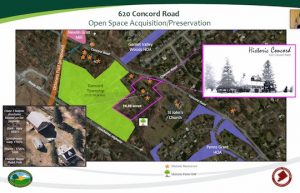Judge James Proud ruled against the petition by Concord First because the petitioners waited too long to request the ballot question.
Concord First is the citizens’ group that wants voters in Concord Township to decide whether or not the township should change its status from township of the second class to township of the first class.
The group needed 583 signatures on a petition to have the question placed on the November ballot, but obtained almost 1,000. Judge Proud denied the petition on Aug. 14 without giving his reason. Concord First filed an appeal.
Proud, a Delaware County Common Pleas Court judge, responded to the appeal made to Commonwealth Court. In his response, Proud said he denied the petition for the November 2014 ballot because the petition is at least a year too late. According to the judge, the petition for the ballot question should have been made in time for the 2013 election, at the latest.
[Only townships with a density of 300 residents per square mile may be townships of the first class. Concord qualifies based on the 2010 census, which was recorded in 2011.]
Proud wrote: “The first general election occurring at least 90 days after the 2010 United States census was in the calendar year 2012 and the first municipal election occurring at least 90 days after the 2010 census was in the calendar year 2013. Accordingly, petitioners’ petition fails to meet the requirements of 53 P.S. (Section) 55207.”
Proud also questioned the validity of some of the signatures.
As expected, members of Concord First strongly disagree with the judge.
“It’s a misreading and misinterpretation of the statute,” said Dan Levin, one of the people who collected signatures for the petition.
“I think [Judge Proud’s] reading of the statute only gives a small window during which this kind petition of petition can be put before the voters,” Levin said.
According to Levin, the election must be both the first after the census, but also after a petition is filed.
“Then you find the next election not less than 90 days,” he said. “That’s the way it’s always been done. That’s the correct grammatical reading of the statute.”
Levin added that this is a statutory interpretation case. As such, he said, Commonwealth Court should go straight to the statute and “give no weight to what Judge Proud said. They should look at it fresh. It won’t really matter what the judge said. They’ll look at the arguments themselves and make a decision.”
As for duplicate signatures, Levin said Proud didn’t strike any and, even if that would have happened, Concord First obtained almost twice as many as were needed.
Concord First, not represented by an attorney for the appeal, has until 4 p.m. on Aug. 29 to file its arguments with the state court.
Levin expects the court to act quickly so that the question can be on the November ballot.
“Nobody should bet against that,” Levin said.
About Rich Schwartzman
Rich Schwartzman has been reporting on events in the greater Chadds Ford area since September 2001 when he became the founding editor of The Chadds Ford Post. In April 2009 he became managing editor of ChaddsFordLive. He is also an award-winning photographer.



Judge Proud made the correct decision.
Mr. Levin’s supposed “statutory interpretation” is laughable.
Expect the Commonwealth Court to uphold the trial court’s decision and as is likely, declare the ballot petitioning provision of the First Class Township Code as unconstitutional.
I certainly can’t predict how a court might rule, but the only thing I find “laughable” is the statement in the prior comment that Dan Levin’s position is “laughable.” There does appear to be precedent of other townships being allowed to go forth with a ballot initiative in a year other than one closely following the census. And it is hard to believe lawmakers would restrict it to such a short window. Afterall, in Concord Township’s case the population density just keeps getting greater as more and more development comes on line.
So, let’s wait for the Commonwealth Court decision…and hope it is free from political pressure.
Laughable you say?
Read the statute for yourself:
Section 207. Submission of Question to Voters.–At the first general or municipal election occurring at least ninety days after the ascertainment, by special enrollment or from the last preceding United States census, that any township of the second class has a population of at least three hundred inhabitants to the square mile, and after a petition signed by at least five per centum of the registered voters of the township has been filed in the quarter sessions court, the question whether such township of the second class shall become a township of the first class shall be submitted to the voters of the township, and the county board of elections shall cause to be printed on separate ballots, to be used in such township at such election, a proper question framed in accordance with the Pennsylvania Election Code.
The last laugh will go the nearly 1000 people who signed the Concord First petition. Only someone who isn’t paying attention, or wants to read the statute some other way, would think it says the only elections the question can apply to are the ones after the census.
Of course the statute Dan Levin quotes is not the one the Board of Elections used in their brief or that the Judge included in his opinion. Their version cut out inconvenient words and misrepresented the actual text of the statute to point to an absurdist conclusion that such a petition could only be sustained in the election immediately following a census.
Unbelievable…and really sort of a metaphor for what one party rule conjures up to preserve their stranglehold on local decisions (Yes, I realize similar things go on in many Democratic strongholds too). So ultimately that is the purpose of this first class township effort…to get some transparency in a local government that has become too insulated and devious in its governance and decision making.